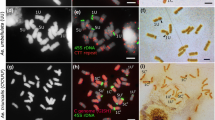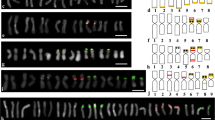Abstract
The positions of the genomes originating from each parent were analysed in root-tip nuclei of the mature, sexual F1 hybrid plant Hordeum vulgare (barley) x Secale africanum (a wild rye). The two genomes of the hybrid were identified in both spread and sectioned material by non-radioactive DNA:DNA in situ hybridization using labelled total genomic DNA from one parent as a proble and unlabelled total genomic DNA from the other parent to block non-specific hybridization. Complete three-dimensional reconstructions of sets of labelled sections enabled detailed analysis of the position of the genomes at interphase. The parental genomes lay in various non-intermixed configurations, including lateral and concentric arrangements. On spread preparations, the two parental genomes were found to be spatially separated throughout the cell cycle; the genome originating from H. vulgare tended to be located more centrally than that from S. africanum. This results show that the nucleus is spatially organized above the level of the DNA and chromosome at the genome level.
Similar content being viewed by others
References
Anamthawat-Jónsson K, Heslop-Harrison JS (1990) Centromeres, telomeres and chromatin in the interphase nucleus of cereals. Caryologia 43: 205–213
Anamthawat-Jónsson K, Schwarzacher T, Leitch AR, Bennett MD, Heslop-Harrison JS (1990) Discrimination between closely related Triticeae species using genomic DNA as a probe. Theor Appl Genet 79: 721–728
Appels R (1989) Three-dimensional arrangements of chromatin and chromosomes: old concepts and new techniques. J Cell Sci 92: 325–328
Avivi L, Feldman M, Brown M (1982) An ordered arrangement of chromosomes in the somatic nucleus of common wheat, Triticum aestivum L. II. Spatial relationships between chromosomes of different genomes. Chromosoma 86: 17–26
Bennett MD (1984) Nuclear architecture and its manipulation. In: Gustafson JP (ed) Gene manipulation in plant improvement. Plenum Press, New York, pp 469–502
Bennett MD (1988) Parental genome separation in F1 hybrids between grass species. In: Brandham PE (ed) Kew chromosome conference III. HMSO London, pp 195–208
Bennett MD, Smith JB (1976) Nuclear DNA amounts in angiosperms. Philos Trans R Soc [Biol] 274: 227–274
Borden J, Manuelidis L (1988) Movement of the X chromosome in epilepsy. Science 242: 1687–1691
Brandriff BF, Gordon LA, Segraves R, Pinkel D (1991) The malederived genome after sperm-egg fusion: spatial distribution of chromosomal DNA and paternal-maternal genomic association. Chromosoma 100: 262–266
Cremer T, Cremer C, Baumann H, Luedtke EK, Sperling K, Teuber V, Zorn C (1982) Rabl's model of the interphase chromosome arrangement tested in Chinese hamster cells by premature chromosome condensation and laser-UV-microbeam experiments. Hum Genet 60: 46–56
de Graaf A, van Hemert F, Linnemans WAM, Brakenhoff GJ, de Jong L, van Renswoude J, van Driel R (1990). Three-dimensional distribution of DNase I-sensitive chromatin regions in interphase nuclei of embryonal carcinoma cells. Eur J Cell Biol 52: 135–141
Ferguson-Smith MA (1991). Invited editorial: Putting the genetics back into cytogenetics. Am J Hum Genet 48: 179–182
Finch RA, Bennett MD (1982) The karyotype of Tuleen 346 Barley. Theor Appl Genet 62: 53–58
Finch RA, Bennett MD (1983) The mechanism of somatic chromosome elimination in Hordeum. In: Brandham PE, Bennett MD (eds) Kew chromosome conference II. George Allen and Unwin, London, pp 147–154
Finch RA, Smith JB, Bennett MD (1981) Hordeum and Secale mitotic genomes lie apart in a hybrid. J Cell Sci 52: 391–403
Flavell RB, Rimpau J, Smith DB (1977) Repeated sequence DNA relationships in four cereal genomes. Chromosoma 63: 205–222
Gleba YY, Parokonny A, Kotov V, Negrutiu I, Momot V (1987) Spatial separation of parental genomes in hybrids of somatic plant cells. Proc Natl Acad Sci USA 84: 3709–3713
Hens L, Baumann H, Cremer T, Sutter A, Cornelis JJ, Cremer C (1983) Immunocytochemical localization of chromatin regions UV-microirradiated in S phase or anaphase: evidence for a territorial organization of chromosomes during cell cycle of cultured Chinese hamster cells. Exp Cell Res 149: 257–269
Heslop-Harrison JS, Bennett MD (1984) Chromosome order-opssible implications for development. J Embryol Exp Morphol 83: 51–73
Heslop-Harrison JS, Bennett MD (1990) Nuclear architecture in plants. Trends Genet 6: 401–405
Heslop-Harrison JS, Leitch AR, Schwarzacher T, Anamthawat-Jónsson K (1990) Detection and characterization of 1B/1R translocations in hexaploid wheat. Heredity 65: 385–392
Hubert J, Bourgeois CA (1986) The nuclear skeleton and the spatial arrangement of chromosomes in the interphase nucleus of vertebrate somatic cells. Hum Genet 74: 1–15
Leitch AR, Mosgöller W, Schwarzacher T Bennett MD, Heslop-Harrison JS (1990) Genomic in situ hybridization to sectioned nuclei shows chromosome domains in grass hybrids. J Cell Sci 95: 335–341
Lichter P, Cremer T, Borden J, Manuelidis L, Ward DC (1988) Delineation of individual human chromosomes in metaphase and interphase cells by in situ suppression hybridization using recombinant DNA libraries. Hum Genet 80: 224–234
Linde-Laursen I, Jensen J (1984) Separate location of parental chromosomes in squashed metaphases of hybrids between Hordeum vulgare L. and four polyploid, alien species. Hereditas 100: 67–73
Linde-Laursen I, Jensen J (1991) Genome and chromosome disposition at somatic metaphase in a Hordeum x Psathyrostachys hybrid. Heredity 66: 203–210
Manuelidis L (1984) Different central nervous system cell types display distinct and nonrandom arrangements of satellite DNA sequences. Proc Natl Acad Sci USA 81: 3123–3127
Manuelidis L (1985) Individual interphase chromosome domains revealed by in situ hybridization. Hum Genet 71: 288–293
Manuelidis L, Borden J (1988) Reproducible compartmentalization of individual chromosome domains in human CNS cells revealed by in situ hybridization and three-dimensional reconstruction. Chromosoma 96: 397–410
Meinkoth J, Wahl G (1984) Hybridization of nucleic acids immobilized on solid supports. Anal Biochem 138: 267–284
Mukai Y, Endo TR, Gill BS (1991) Physical mapping of the 18S.26S rRNA multigene family in common wheat: identification of a new locus. Chromosoma 100: 71–78
Nur U (1990) Heterochromatization and euchromatization of whole genomes in scale insects (Coccoidea: Homoptera). Development (Suppl): 29–34
Odartchenko N, Keneklis T (1973) Localization of paternal DNA in interphase nuclei of mouse eggs during early cleavage. Nature 241: 528–529
Pinkel D, Landegent J, Collins C, Fuscoe J, Segraves R, Lucas J, Gray J (1988) Fluorescence in situ hybridization with human chromosome-specific libraries: detection of trisomy 21 and translocations of chromosome 4. Proc Natl Acad Sci USA 85: 9138–9142
Rechsteiner M, Parson B (1976) Studies on the intranuclear distribution of human and mouse genomes and formation of human-mouse hybrid cells. J Cell Physiol 88: 167–179
Schardin M, Cremer T, Hager HD, Lang M (1985) Specific staining of human chromosomes in Chinese hamster x man hybrid cell lines demonstrates interphase chromosome territories. Hum Genet 71: 281–287
Schwarzacher HG (1976) Chromosomes in mitosis and interphase. Springer, Berlin Heidelberg New York
Schwarzacher T, Leitch AR, Bennett MD, Heslop-Harrison JS (1989) In situ localization of parental genomes in a wide hybrid. Ann Bot 64: 315–324
Schwarzacher-Robinson T, Finch RA, Smith JB, Bennett MD (1987) Genotypic control of centromere positions of parental genomes in Hordeum x Secale hybrid metaphases. J Cell Sci 87: 291–304
Shiwago PJ (1924) The chromosome complexes in the somatic cells of male and female of the domestic chicken. Science 60: 45–46
White MJD (1973) Animal cytology and evolution, 3rd edn. Cambridge University Press, Cambridge
Young SJ, Stephens J, Royer SM, Groves PM, Kinnamon JC (1987) Three-dimensional reconstructions from serial micrographs using the IBM PC. J Electron Microsc Tech 6: 207–217
Zelesco PA, Marshall-Graves JA (1988) Chromosome segregation from cell hybrids IV. Movement and position of segregant set chromosomes in early-phase interspecific cell hybrids. J Cell Sci 89: 49–56
Author information
Authors and Affiliations
Additional information
by M.F. Trendelenburg
Rights and permissions
About this article
Cite this article
Leitch, A.R., Schwarzacher, T., Mosgöller, W. et al. Parental genomes are separated throughout the cell cycle in a plant hybrid. Chromosoma 101, 206–213 (1991). https://doi.org/10.1007/BF00365152
Received:
Accepted:
Issue Date:
DOI: https://doi.org/10.1007/BF00365152




